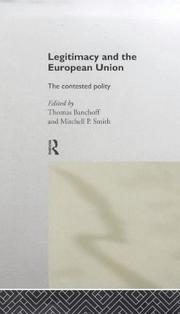| Listing 1 - 3 of 3 |
Sort by
|
Book
ISBN: 1283524031 9786613836489 1442217103 9781442217102 9781283524032 9780742526136 0742526135 9780742526129 0742526127 6613836486 Year: 2012 Publisher: Lanham Rowman & Littlefield
Abstract | Keywords | Export | Availability | Bookmark
 Loading...
Loading...Choose an application
- Reference Manager
- EndNote
- RefWorks (Direct export to RefWorks)
Germany's Foreign Policy of Reconciliation examines the Federal Republic's external relations with four former enemies-France, Israel (the Jewish people), Poland, and Czechoslovakia/the Czech Republic-as it achieved international rehabilitation after the Holocaust. The book develops the concept of international reconciliation while illustrating its manifestation in practice, blending and balancing moral imperatives with pragmatic interests. Germany emerges as a model for how the bitterest of former international enemies can reconcile.
Reconciliation --- Peace making --- Peacemaking --- Reconciliatory behavior --- Quarreling --- Political aspects --- History --- Germany --- France --- Israel --- Poland --- Czech Republic --- Česká republika --- ČR --- Tschechische Republik --- Česko --- Czechia --- チェコ --- Cheko --- チェコ共和国 --- Cheko Kyōwakoku --- Tschechien --- Tschechenland --- Tschechei --- République tchèque --- República Checa --- Chequia --- Txèquia --- Txeca --- República Txeca --- Češka --- Czech Socialist Republic (Czechoslovakia) --- Czechoslovakia --- Alemania --- Ashkenaz --- BRD --- Bu̇gd Naĭramdakh German Uls --- Bundesrepublik Deutschland --- Deutsches Reich --- Deutschland --- Doitsu --- Doitsu Renpō Kyōwakoku --- Federal Republic of Germany --- Federalʹna Respublika Nimechchyny --- FRN --- German Uls --- Germania --- Germanii︠a︡ --- Germanyah --- Gjermani --- Grossdeutsches Reich --- Jirmānīya --- KhBNGU --- Kholboony Bu̇gd Naĭramdakh German Uls --- Nimechchyna --- Repoblika Federalin'i Alemana --- República de Alemania --- República Federal de Alemania --- Republika Federal Alemmana --- Vācijā --- Veĭmarskai︠a︡ Respublika --- Weimar Republic --- Weimarer Republik --- ХБНГУ --- Германия --- جرمانيا --- ドイツ --- ドイツ連邦共和国 --- ドイツ レンポウ キョウワコク --- Germany (East) --- Germany (Territory under Allied occupation, 1945-1955) --- Germany (Territory under Allied occupation, 1945-1955 : British Zone) --- Germany (Territory under Allied occupation, 1945-1955 : French Zone) --- Germany (Territory under Allied occupation, 1945-1955 : Russian Zone) --- Germany (Territory under Allied occupation, 1945-1955 : U.S. Zone) --- Germany (West) --- Holy Roman Empire --- Dawlat Isrāʼīl --- Država Izrael --- Dzi︠a︡rz︠h︡ava Izrailʹ --- Gosudarstvo Izrailʹ --- I-se-lieh --- Israele --- Isrāʼīl --- Isŭrael --- Isuraeru --- Izrael --- Izrailʹ --- Medinat Israel --- Medinat Yiśraʼel --- Stát Izrael --- State of Israel --- Yiselie --- Yiśraʼel --- Ισραήλ --- Израиль --- Государство Израиль --- Дзяржава Ізраіль --- Ізраіль --- מדינת ישראל --- ישראל --- إسرائيل --- دولة إسرائيل --- イスラエル --- 以色列 --- Palestine --- Foreign relations --- Deguo --- 德国 --- Gėrman --- Герман Улс


ISBN: 0415181895 Year: 1999 Publisher: London Routledge
Abstract | Keywords | Export | Availability | Bookmark
 Loading...
Loading...Choose an application
- Reference Manager
- EndNote
- RefWorks (Direct export to RefWorks)
Since the Maastricht ratification debate of the early 1990s, the legitimacy of the European Union has become a subject of controversy. With unprecedented force, Europeans have begun to question the need for deeper integration. Some fear threats to established national identities, while others perceive the emergence of a distant but powerful Brussels, beyond the reach of democratic control. Legitimacy and the European Union breaks with established approaches to the problem of the legitimacy of the European Union by focusing on the recent trend towards reconceptualization of the EU not as a superstate or an organization of states, but as a multi-level, contested polity without precedent. The book examines the implications of this reconceptualization for the problem of legitimacy. Individual chapters focus on policy areas, institutions and identity politics. Taken together, they reach two main conclusions. While Europeans do not strongly identify with the EU, they increasingly recognize it as a framework for politics alongside existing national and subnational structures. And while the EU lacks central democratic institutions, the integration process has spawned significant informal and pluralist forms of representation. Rethinking recognition and representation ouside the context of the nation state points to important, if little understood, actual and potential sources of EU legitimacy. (Bron: covertekst)
Political sociology --- European Union --- Europees beleid --- Europese eenmaking --- #SBIB:324H50 --- #SBIB:004.IEB --- #SBIB:327.7H201 --- #SBIB:327.7H220 --- 327 --- Politieke participatie en legitimiteit (referenda, directe democratie, publieke opinie...) --- Europese Unie: politieke theorie --- Europese Unie: instellingen en besluitvorming --- European federation. --- Legitimacy of governments --- European federation --- Governments, Legitimacy of --- Legitimacy (Constitutional law) --- Consensus (Social sciences) --- Revolutions --- Sovereignty --- State, The --- General will --- Political stability --- Regime change --- Federation of Europe --- Pan Europa movement --- Paneuropean federation --- United States of Europe (Proposed) --- Federal government --- Regionalism (International organization) --- European Union. --- E.U.
Book

ISBN: 9781685853280 1685853285 Year: 2023 Publisher: Boulder : Lynne Rienner Publishers,
Abstract | Keywords | Export | Availability | Bookmark
 Loading...
Loading...Choose an application
- Reference Manager
- EndNote
- RefWorks (Direct export to RefWorks)
A multidisciplinary group of U.S. and European experts address EC institutions and laws, the internal market, key policy issues, and external relations.
| Listing 1 - 3 of 3 |
Sort by
|

 Search
Search Feedback
Feedback About
About Help
Help News
News